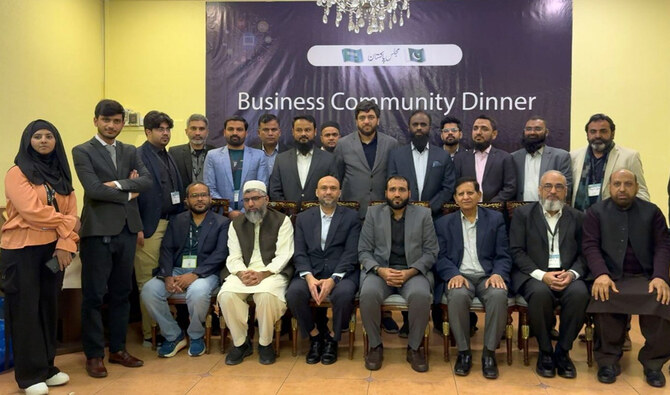KARACHI: A sign hanging on a tree reads: “We do not have Wi-Fi. Talk to each other. Pretend it’s 1995.”
This is Mazi Cafe, set up in the backyard of an old house in Pakistan’s commercial capital of Karachi as a haven for people eager to spend more time off the digital world, reduce screen time and establish real-life contact. There is no Internet connectivity and visitors are encouraged to have conversations over a cup of coffee or tea, or to read books from the cafe’s collection.
The setting is also quite serene and adds to the cafe’s nostalgic charm: trees towering over a dimly lit backyard in an old house built five decades ago by the family of the owners, Asif Jalil, a doctor, and his wife Aqsa, who opened the cafe in October last year.
The Jalils say the cafe, whose name means ‘the past’ in the Urdu language, is more than a cafe but has evolved into a community hub for people of all age groups seeking to disconnect briefly from the commotion of Karachi, Pakistan’s largest city, with a population exceeding 20 million.
“The idea was generated by both of us because we both, as a couple, loved coffee,” Aqsa told Arab News. “When we would sit in this backyard of ours, we thought why not create a place where we cannot use mobile phones and instead of that, we can talk to each other and we can always sit in a peaceful and calm environment and just look at the trees and hear the noise of the birds chirping.”
Aqsa said it really bothered her that people always took pictures of their meals to share with others on social media, which inspired her to create a space where people could put their phones away as they enjoyed coffee and chatted.
“They automatically just put their mobile phones in their bags or in their pockets, and they just talk to each other when they are here,” she said.
“We have customers of all age groups at our cafe and surprisingly the younger generation are more interested to not use mobile phones than the older generation.”
The coffee is also great, said Jalil, who sources beans from Redberry Roasters, a high-end coffee bean and equipment supplier in the eastern city of Lahore.
“We have probably one of the best machines, one of the best grinders, and one of the best baristas in Pakistan,” he said. “I just happen to be lucky that I have a combination of all these three.”
There is also a collection of books to read if you happen to come alone.
“If someone doesn’t have a companion, we have company for them, which is a bunch of books,” Jalil added. “So we have fiction, non-fiction, politics, biography, pretty much everything.”
The response has been surprisingly positive, with patrons describing the cafe as a much-needed relief from an ever-connected life full of notifications.
Arham Lodhi, a 21-year-old computer science student, described Mazi Café as a “refreshing departure” from conventional coffee shops.
“This café is different from others in the sense that its ambiance is quite natural. If you look at other cafés, they don’t have this kind of atmosphere, most of them are renovated and modern these days,” he said.
“But this place has an aesthetic that brings back old memories.”

















